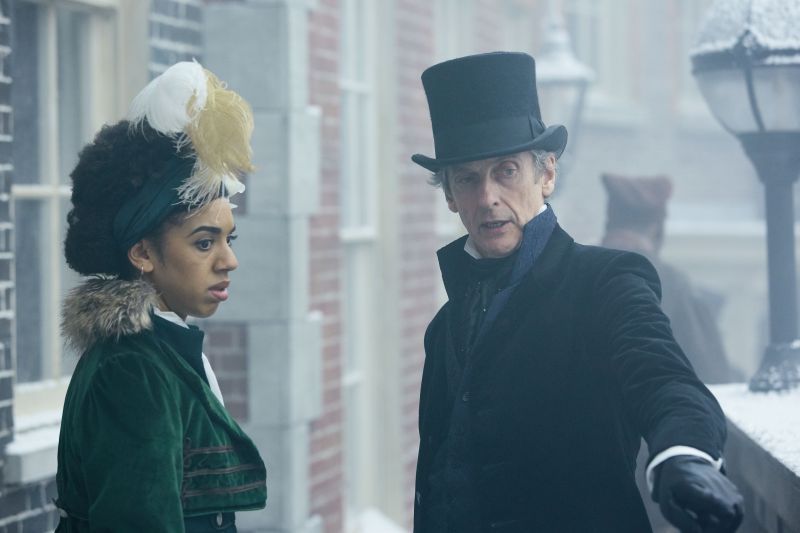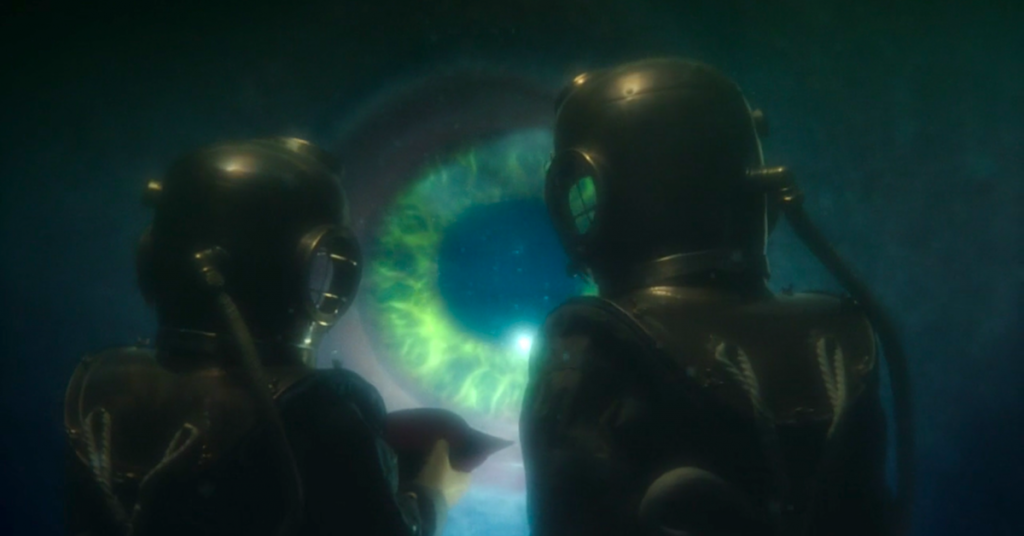DOCTOR WHO, SERIES 10 EPISODE 3:
THIN ICE
Doctor: Twelfth (Peter Capaldi)
Companion: Bill
May 2023

This is a really good episode.
Picking directly up off the tail of Smile, Bill and the Doctor are spat out into Victorian London during the last great ice fair: 1814.
A bit of historical context: the ice fairs were large fairs held on the River Thames for a period of, really, several centuries, but especially during the “little Ice Age” roundabout 16-1800, held mostly whenever the river froze over (helped by things like the construction of the contemporary London Bridge). Frankly, it’s an extremely cool setting for a Doctor Who episode. 1814 is, by all accounts, the last one of these, and from some cursory internet research this is a startlingly accurate representation of it. There was an elephant that walked around it; the setup and characters all fit in; and five people drowned when the ice melted. Which is one more than the number of deaths that are shown in Thin Ice.
Let’s also talk about race, here. Bill is obviously black, and she brings up the point at the beginning of the episode that slavery was completely legal at this time. And racism is tackled, here: it’s not the primary focus of the script, which is probably good, but it’s also not completely sidelined, which is important: in addition to Bill’s mention at the start of the episode, she then mentions that it’s a more diverse area than she would have anticipated (historically true!). Additionally, overt racism does appear (albeit briefly) in a rather brilliant scene: tying into their ongoing argument, the Doctor more or less lectures Bill about possibly having to use charm against an awful person, and not speaking one’s mind. Said person enters, is immediately racist towards Bill, and the Doctor clocks him in seconds. It’s great! He’s being a hypocrite, but he’s being a hypocrite in a way that not only can we get behind, but additionally further illuminates the conflict between our two leads this episode.
Oh, yeah. The conflict. In Smile, we essentially got 30 minutes of Bill and the Doctor hanging out and palling around. Here, their relationship is still a focus, but they go through a major fight, and it’s a fight about a thing that hangs over the entire episode: it’s a fight about death.
Over the course of the episode, to the best of my knowledge, four characters die. But comparing it to Smile, where nominally at least twenty characters die, Thin Ice feels so much darker. And that’s for a couple reasons: firstly, while Smile sidesteps any sort of emotional resonance in its climax, more or less erasing all the impact of its character deaths, Thin Ice is actually a story about death. And it hammers this point home by portraying (to the best of my knowledge) the only on-screen death of a child in the entire show so far.
There’s usually a sort of kayfabe around child death in stories: generally, stories shy away from this unless they’re attempting to be particularly dark, gritty, or (as the case may be) “realist”. Children dying is a particularly grim prospect! And as such, Doctor Who has (reasonably) shied away from it before, in stories like Curse of the Black Spot. Here, however, there is no getting around it: a boy dies. His name is Spider. And he dies.
This becomes the inciting incident for Bill’s argument with the Doctor, and it makes their argument all the more cutting, because it is lent this emotional resonance. It also, wisely I think, lets Bill win (at least in their initial argument). Because she’s right! This really matters! Throughout the story the Doctor talks about having to take a detached view of the world, and “not having time for outrage”—and he’s then promptly proved a hypocrite. This is very good, because it allows us to continue rooting for him: he’s just hiding his emotions. And he’s bad at it! See: the hypocrisy mentioned above, which also leads to a phenomenal speech from the Doctor about the value of life, and a long shot lingers on Bill’s teary-eyed reaction to it. It’s an extremely powerful resolution.

While at times the episode nearly strays into making the Doctor too unfeeling (for example, nominally prioritizing the wellbeing of his sonic screwdriver over the wellbeing of two people), it makes sure to counterbalance this with this running argument between him and Bill, as well as things like the scene where he reads a bedtime story to all the orphans, which are legitimately sweet.
One last thing before we get to my conclusions, and it’s spoilers:
I really like the antagonist of this episode, Sutcliffe. He’s an excellent showing of the very banality of evil—not an unfamiliar topic for Doctor Who, but one executed particularly well here. The first revelation is that the monster eating people isn’t evil; the second, that it’s chained; and the third, that who and how it was chained doesn’t matter. What matters is that it (and simultaneously, everyone on the Frost Fair—a note: this does briefly make it appear as though the Doctor and Bill are prioritizing a big fish’s life over the people it’s eating, but fortunately this doesn’t last long) is being exploited by Sutcliffe in order to make money at the expense of countless lives. It’s telling that our introduction to Sutcliffe is him being horrifically racist: he is the most boring of villains, a man with simple and selfish goals who doesn’t care or even have an emotional stake in our heroes!—and that makes him all the more relevant. He’s a rich man concerned about making money and he will go out of his way to kill people if it means he can make more money from a product. He will go out of his way to kill children if it means he can make more money from a product. Is it subtle? No, absolutely not. But that doesn’t make it any less strong of a narrative device. It doesn’t matter how the monster got here! What matters is this man is using it to kill people for money! Fuck him!!
Also, it’s very, very wonderful that Bill gets to look up the history on her phone afterward and find out that everything went well with the problems they fixed. Often the Doctor & companion(s) just sort of fuck off after nominally fixing the problem, and so it’s great to have a confirmation that everything worked out even after they left here. It’s a small thing, but it’s nice.
Nardole continues to be here! He’s funny, when he is here, which isn’t for very long. We get some more vague ominous notions towards the series-long plot, which conveniently don’t get in the way, which is very nice.
Overall thoughts:
I think this is the best story we’ve had in the season so far. It’s a wonderful exploration of death, what seeing a lot of death can do to you, and the characters of Bill and the Doctor. It’s also rousingly anticapitalist and set back in Steven Moffat’s apparent favorite place to visit: Victorian London. It’s really very good!! I highly recommend it.
Next up, we’ve got DAVID SUCHET!!!!!!!!!!!! and the last episode I’ve seen in this season. Wait. Next up, we’ve got the most recent Doctor Who episode I’ve seen, full stop: Knock Knock. Looking forward to it!